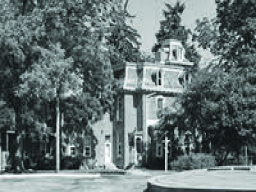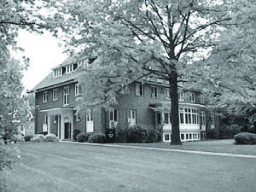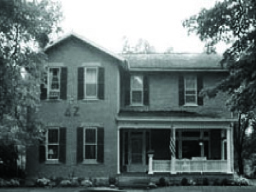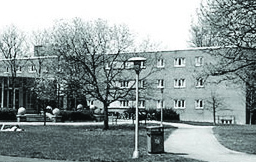Two of the most tight-knit communities at Ohio Wesleyan are Greek Life and the Small Living Units. These two communities collaborate, but do they also clash?
Greek life and SLUs are two of the larger organizations on Ohio Wesleyan’s campus. From an outside perspective, they may appear to be two organizations whose paths would never cross. They may seem to have different values from one another and often one has stereotypes about the other.
But recently those stereotypes that may have kept a member of one organization from joining another seem to be changing. With all but one sorority represented in the SLUs it seems stereotypes about these two organizations may be in the past.
There are seven SLUs located on OWU’s campus. Each SLU house is dedicated to a different cause, such as women’s rights, environmental causes, human justice, etc. There are values that come along with living in a SLU. These values are a part of both the wide spread SLU community and each house.
Carrie Miller, residential life coordinator of Hayes and the SLUs, believes the values the SLUs have are unique and important for students who do not find dormitory life to be a good fit.
“I think one of the main values that SLUs bring to OWU is a really centralized space of discussion of ideas and projects that educate the community,” Miller said. The SLUs create a community of “independence, creativity, and advocacy. Students who think differently about things and are passionate about something enough to want to educate the community about it,” Miller said.
These values and the tight community that SLUs are associated with can often be what perpetuate the stereotypes and feelings SLU members have towards Greek life.
Junior Chris Marshall, who is a member of Tree House, said he has some negative feelings about Greek life.
“I don’t have the highest opinion of Greek life as far as compared to how I’m living now,” he said. “The frats have a pretty negative reputation on campus. I’m not sure it’s all fair but it’s not something I wanted to be a part of.”

“Within our house we do use the term ‘frat guys’ in a negative connotation sometimes, because we have neighbors who are loud and I guess we don’t have the best opinion of frats,” he said.
Marshall does feel, however, that there is a more positive feeling about sororities within Tree House. Partly, he believes, because one of their house members is in a sorority and also because many of Tree House’s members have friends who are in sororities.
While there may be negative stereotypes that people in SLUs have about Greek life, SLU members said they are aware that there are also stereotypes which people both in the Greek community and in general, associate with them.
One of the largest stereotypes that SLUs face is that they are inaccessible.
Junior Victoria Sellers, who is a member of the Women’s House, feels that this stereotype comes from people not being familiar with SLUs.
“I think people who aren’t involved or friends with the SLU community are a bit intimidated by SLUs in general, since the SLU members are usually very tight-knit based on living situation and interests.”
Similarly to the SLU community, Greek women who do not live in SLUs are also aware of the stereotypes about sororities, but according to junior Margaret Bagnell who is a member of Tri-Delt, these stereotypes are something to work through.
“The stereotype of being a sorority woman is something that all women who are affiliated deal with,” she said. “Although it is mostly negative it offers us a chance to break that description and show that we are not what people see in the movies.”
Bagnell said she has heard few negative stereotypes about the SLUs in the Greek community and she considers them to be very much like a sorority.
“SLU… occupants I consider to live somewhat like a sorority,” she said. “Each SLU stands for certain values and can be identified with some hobby or interest they all share. SLUs I think offer people another way of being a part of something bigger on campus, just like sororities do.”

Members of the Greek community who live in SLUs do so for a variety of reasons, one of them being to increase their level of involvement on campus.
That was the case for junior Amanda Boheme who lives in the Inter-Faith house and is a member if Delta Zeta.
“I wanted to be more involved on campus … the SLUS concentrate on different issues and I wanted to give back to the community, I wanted to make myself exist on campus,” she said.
While many Greek women in SLUs joined to get more involved, their reason for joining a sorority was usually different.
That was the case for Junior Anna Cooper, who recently was accepted to live in the house of Peace and Justice next year and is a member of Delta Zeta. She said her reason for joining a sorority was much different than for joining P&J.
“I was opposed to Greek life because I didn’t fully understand how genuine it was and how it could help me grow as a person,” she said. “Once I decided to be open to it I saw that it would be a positive experience, they appreciated me as an individual but wanted to help me grow as a person.”
Although these women have chosen to join a sorority and live in a SLU they are still aware of some stereotypes that are said about Greek life within SLU life.
Senior Maren Oehl lives in the Inter-Faith house and is a member of Kappa Alpha Theta. She feels people rarely say negative things about Greek life in the SLU community but when they do they are usually general comments.

Cooper echoes Oehl in thinking the negative comments are coming from people who do not really understand Greek life, but she also adds that she has heard more negative comments about fraternities because Greek men cannot live in SLUs.
“I’ve heard negative comments before towards Greek life, I think it’s mostly from people who don’t totally understand what Greek life is and the positive experience,” she said. “I think its more men than women because there are no Greek men in SLUs, there are no Greek men to offend.”
There seem to be still mixed feelings about Greek life within SLUs, but the attitude seems to be one of at least partial understanding, perhaps because sorority women are becoming more present in the SLU community.
Sophomore Rachel Vinciguerra feels that because she has a lot of Greek women in her house people are more understanding of her commitments to Kappa Alpha Theta.
“Our house is nice because we have four of the five sororities on campus represented and people in the house are very understanding of our sorority commitments since it pertains to so many of us,” she said.
Not only does Vinciguerra say she feels that the Inter-Faith house is more understanding, she also feels they are more encouraging of her sorority activities.
“At IF everyone is really supportive of our philanthropy events,” she said. “Our house had a team for DZ’s Jello tug-of-war and many of my housemates donated to CASA by helping out with food points for Kats and Bats.”
There seems to be more willingness from both the Greeks and SLUs to collaborate the two organizations more frequently, despite the stereotypes floating around.
“I think Greek Life and SLU life could work well hand in hand,” Bagnell said. “When it comes down to the core values, each house, whether Greek or SLU, are very similar in the way that they offer people a place where they can grow and become a part of something, and to have places on campus which allow people to make more sense of college life and develop more intimate relations with others is a great thing.”